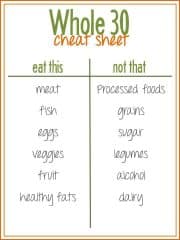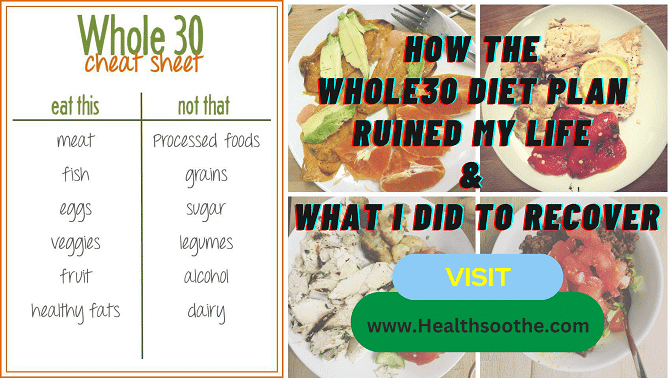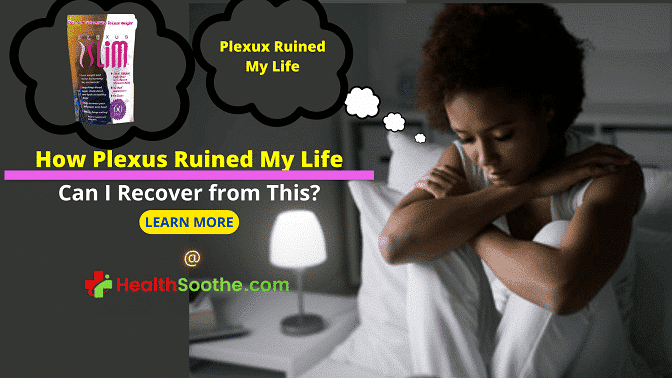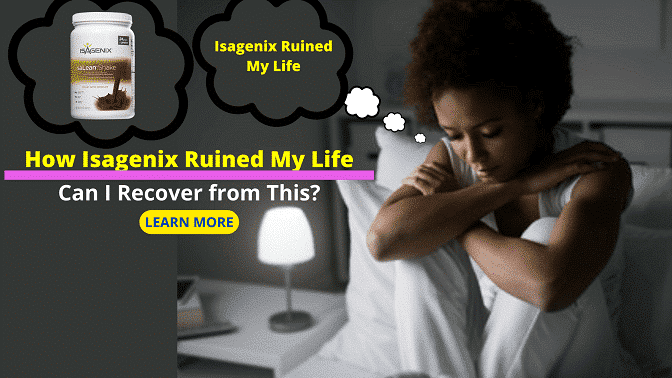Whole30 ruined my life! – Have you ever heard this before and wondered how this can ruin a person’s life, especially if it consists of a weight loss regime?
There was a time when people everywhere were trying Whole30, a program that requires followers to completely eliminate all sugar and sweeteners, grains, legumes, dairy, and alcohol for 30 days.
Cutting out these food groups, followers hope, will allow them to identify – and then eliminate forever – those foods that are causing digestive issues, allergies, chronic pain, hormonal imbalances, skin problems, and pretty much any other problem they're trying to solve. Weight loss is just an "added benefit," they say.
Given Whole30's widespread popularity and highly appealing promises, you might wonder, "Should I try it too?" In short: Hell, no! In long, read on.
What is this Whole30?

Whole30 is a diet regime that consists of the consumption of healthy, unprocessed foods, including plenty of fruits and vegetables, and it doesn't involve calorie counting or monitoring your weight. The Whole30 regime is only 30 days.
The Whole30 Diet – a restrictive 30-day diet meant to reset your body by putting an end to unhealthy cravings and habits, identifying food groups that disagree with it, and treating medical conditions – is lauded by celebrities and general consumers alike. However, it ranks near the bottom of U.S. News & World Report's Best Diets list, tied at No. 37 of 40 diets.
So if everyone is seemingly doing the Whole30 Diet, why does it perform so poorly?
Whole30 Ruined My Life! – How Can a Diet Program Ruin Someone’s Life?
“Whole30 ruined my life” – People who made this statement were followed and asked why they said; ‘Whole30 ruined my life’, so as to make sure their claims were valid, and it was verified that the majority who made this statement were able to confirm that Whole30 did a great deal of damage to them.
And now, I will drop the verified experiences of these people who said that Whole30 was no good for them so that you can see or read for yourself how legit the statement; “Whole30 ruined my life” is;
From Dina Ley: Whole30 Changed My Life: But, Not In The Way You May Think
I like a challenge. Challenge is one of the reasons I loved teaching high school kids. Challenges drive me, invigorate me, jolt me from stagnancy. So, when a friend mentioned she was doing the Whole30 challenge, I was intrigued and immediately jumped on the bandwagon.
The “Whole30: Let Us Change Your Life” Promise:
Simply, you are allowed to eat meat, fish, eggs, vegetables, and healthy fats. You are not allowed to eat anything else.
Whole30 markets itself as “pushing a ‘reset’ button with your health, your habits, and your relationship with food.”
The physical benefits of Whole30 are supposed to be “profound”: “weight loss, improvement in body composition, high energy, better sleep, improved focus and mental clarity, healthy digestive function, improved athletic performance, and a sunnier disposition.”
The psychological benefits claim to change your “long-standing, unhealthy habits related to food, develop a healthier body image, reduce or eliminate cravings, particularly for sugar and carbohydrates.”
“Food freedom” is what they call it. I was excited to start!
My Goals
First: I’ll be honest: I really wanted to overcome the weight plateau I have been stuck in since December. I kept bouncing back and forth between 3–4lbs and it was driving me crazy. So frustrating. I had to switch it up.
Second: I wanted to see if eliminating certain foods from my diet would really help me feel better. Would I feel more energized? Would I feel less bloated? How will this affect my mood?
Third: I really wanted to curb my cravings for sweets. My hope was to no longer feel deprived of sweets and to have more of a casual outlook towards dessert.
Fourth: I wanted to see if I could do it. Could I possibly have the willpower (which I previously somewhat lacked) to conform to this type of lifestyle?
The Start
Oh, a caveat: I am temporarily living with my parents whose house is FULL of non-compliant foods. So, although one of the Whole30 requirements was to rid your house of all non-compliant foods, that was not an option for me. Thus, I had to be extra mindful of temptation. Also, I was already loosely following the Ketogenic Diet, which is similar to Whole30, except dairy is allowed and carbs are not. I go to the gym 3–4 times a week. I’ve been on this “kick” for a year.
The Process
One of the first, and probably most difficult, eliminations was the cream and sugar in my morning coffee. Throughout all of the changes to my diet I made last year, I still kept my cream and sugar because I drink only one cup a day, so I figured it wasn’t a big deal. Well, Whole30 thinks it’s a big deal, so I had to let go. I switched to a splash of unsweetened almond/cashew milk in my coffee, no sugar.
I prepped meals every Sunday. I dislike cooking, so I wasn’t going to get too creative. I stuck to simple meals: grilled/baked fish, meat, poultry, eggs, lox, or sausage with grilled/roasted veggies. I ate some fruit and nuts. I ate a few complaint Lara bars, but to me they taste like chewed up, solidified mush, so not a fan.
The Results
Physically/Physiologically:
I lost those stubborn 5 pounds. My stomach is now flatter.
I had random bursts of energy throughout the 30 days, but I can’t say I was way more energized than before. I was stronger and more driven at the gym, most of the time, but still struggled with motivation at times. I still had difficultly waking up in the morning, possibly more so than before. I never felt bloated, or like I overate, even when I ate a lot. Digestion improved. I got constant headaches and migraines. My blood pressure significantly dropped a few times and I felt rather terrible. I am told this is due to lack of sugar and should have ended within the first week; it did not.
Psychologically/Emotionally:
“Food freedom” this is not. Not for me, anyway. I thought about food more than I thought about anything else. Every choice was a battle. Going out was nearly impossible; one can eat only so much dry chicken/steak (most sauces aren’t complaint). I painstakingly suffered through family dinners, girls’ nights out, dinners with friends, Easter brunch, birthday parties, and company luncheons.1https://forum.whole30.com/topic/58153-help-i’m-regretting-my-whole30-because-now-i-can’t-seem-to-eat-anything/
I was miserable about 30% of the time. And, although 30% seems like a small percentage compared to the benefits I experienced, I was so truly miserable and crabby that the 30% made me slightly despise the entire program. I say “slightly” because I can’t entirely dismiss the good side effects. But, sometimes I hit a wall so hard that quitting seemed like the most rational step. My mind was in constant turmoil over food. I wanted chocolate. I wanted bread. I wanted spicy tuna. I wanted so much. I thought if I stayed true to the program I would no longer want those things, but that proved to be untrue. Today is the last day and I cannot wait to shove a piece of dark chocolate in my mouth for breakfast tomorrow.
Whether we like it or not, food is the center of our lives. Every social gathering revolves around food. Coworkers bond over lunch and bring decadent baked goods. Girls’ nights out involve tasty food and sugary mixed drinks. Family dinners are plentiful. For the past 30 days I felt like a social pariah. I was obsessed with this challenge. I started bringing my own “creamer” to my standing Starbucks date with a friend. I had to ask my friends to special order meals for me when they invited me over. I fought with my parents over food. I would spend hours at the grocery store frantically reading nutritional labels. I had guilt-ridden nightmares in which I binged on cake and other deliciousness only to wake up relieved that I actually didn’t ruin the challenge. I was more stressed more of time. I envied everyone around me who “got” to eat toast. I salivated over a slice of pizza on the ground at the subway station in Philly. I imagined kicking a woman eating gummy bears on the train.
Whole30 took my minimal self-control and drove me into a state of delirious obsession. I may look better. I may feel better in some ways. But, the entire process has been psychologically and emotionally arduous and torturous. So, Whole30 did change my life: It made me realize I am not this person. I am not the person who deprives herself of cake at birthday parties. I am not the person who brings her own food to other people’s events. I am not the person who deprives herself all of the time. I realized these are not my goals, these are not my priorities. I will probably always be slightly overweight (according to those charts, anyway). And, I’m starting to think I am good with that. I’m starting to think if I eat relatively well and continue to be physically active I will be fine. Maybe, more than fine. Whole30 taught me eating whole, fresh food is wonderful for my body (and I will continue to be mindful of what I am eating), but my mental and emotional wellbeing needs chocolate. And, sometimes: cake.
From Tclajones:
I don’t know if anyone can help me - I’m seriously starting to feel depressed with results after my whole30. I followed the program to a T and was VERY diligent to fully eliminate all foods. I’ve never had any noticeable issues processing foods (other than dairy and I already suspected lactose intolerance prior to this program), so I didn’t expect to gain much insight on that end. However, I did frequently have brain fog and always tired/low energy, bouts of anxiety and depression, and just general feeling a bit icky.
My whole30 brought mental clarity that was amazing. I had more energy and didn’t NEED my coffee to function in the morning. I had more drive and motivation for day to day tasks, etc.
Fast forward to my reintroduction (2 weeks into this now)....I started with peanuts, and it seemed to be fine. Next I did sweetened almond milk creamer for my coffee (Califia farms) and I got a nasty headache that hung around all day and I never get headaches.
Once the headache was resolved I tried Gluten free oats and brown rice, and my stomach was miserable with bloating and diarrhea.
I back pedaled and stopped with the grains again, but next I did soy in the form of soy sauce. Again my gut was absolutely wrecked.
I feel like anytime I try anything not ok with the whole30 diet - I get massive headaches and sever gastric upset. I’m so discouraged.
Also.....during my whole30, i didn’t feel sick, but i did have frequent stools and a lot of the time they were loose. i don’t know if that’s normal? i remember think “huh i seem to have diarrhea a decent amount with whole30” a but i never felt miserable with it, so it is very different now with reintroduction and the miserable feelings i get
I’m trying to stay hopeful that maybe I won’t have to forever eliminate my favorite foods. Whole30 was doable for a month, but forever that way is too much and I’m kind of wishing I never even tried this.
Watch the video below to know more on this topic; 'whole30 ruined my life':
Whole30 ruined my life! - A Nutritionist's Manifesto Against the Whole30 Will Shake Your View of Healthy Eating
The Whole30 Trap
Yes, Whole30 encourages the consumption of healthy, unprocessed foods, including plenty of fruits and vegetables. Yes, Whole30 doesn't involve calorie counting or monitoring your weight. Yes, Whole30 is "only" 30 days.
But – but – Whole30 is a distraction from true mental and physical health. Why? Because it's an incredibly restrictive diet that espouses the idea that your worthiness is tied up in your weight, appearance, and ability to resist temptation. In many ways, the Whole30 "program" is even worse than a self-titled "diet" because it pretends it's not a diet at all.
"Our premise is simple," co-founder Melissa Hartwig writes on the program's website. Change your health (tastes, blood sugar regulation, hormonal balance, digestion, immune system), habits (how you reward, self-soothe, comfort, and show love to yourself), and emotional relationship with food (losing cravings, attachments to, and dysfunctional thoughts around food), and healthy body composition has to follow. It HAS to."2https://health.usnews.com/health-news/blogs/eat-run/articles/2018-05-18/this-nutritionists-manifesto-against-the-whole30-will-shake-your-view-of-healthy-eating
But here's the problem: Your body doesn't have to change because we are not all meant to be one size, shape, height, or weight, thanks to genetics. Plus, we humans (thankfully) are built to survive restriction and increase our drive to eat the very things we've been avoiding.
What's worse, for me, is the psychological damage this message could cause. If you buy into the idea that losing your dysfunctional thoughts around food will result in body composition changes, you'll blame yourself for the body you have.
This fantasy that you have absolute control over your appearance and that your emotions are problematic is ripped from the diet rule books – keep people coming back, make them hope to do better next time, and encourage them to repent for all their "sins." This looks more like the cycle of addiction than any sort of helpful plan.
Plus, to truly tackle emotionally driven behaviors around food, you have to remove biological forces, like restriction, that trigger emotional urges in the first place. This important work should not be done in a chat room; it should be explored in collaboration with health professionals who value mental health and well-being over body changes.
Setting Yourself Up for 'Failure'
Sure, some people who try Whole30 may realize that it's unsustainable and walk away pretty much unscathed, save for some wasted time, money, and a new negative attitude about what it takes to eat healthily.
But for many people, Whole30 is unsustainable (even for just 30 days). It essentially bullies them into believing they aren't "good enough" if they can't completely eliminate the laundry list of foods not allowed. There's a dash of sugar in your salad dressing? Fail. Your barista used (gasp) regular milk for your latte instead of almond milk? Fail. Do you opt for the carrots and hummus at a party over the pizza? Doesn't matter; both are failures.
"What I dislike most about the Whole 30 – even more so than the exclusion of foods that are known to promote long-term health – is the rigidity of it," says Diana Rice, a registered dietitian in St Louis, Missouri. "The second you 'slip up,' you have failed. And yes, you have to start the 30-day cycle over at that point, which extends this nonsense even longer."
That experience promotes the notion that you did not have the self-control or intelligence to follow the program, and so are not only failing your own health, but your very self-worth is lacking because you were not able to adhere to someone else's strict, arbitrary guidelines, Rice adds.
This cycle of trying (and failing) at yet another diet creates a shame spiral and lets negative thoughts start to creep in. "I can't go to the reunion looking like this." "I can't give the speech." "I don't want to wear that bathing suit." "Why can't I be successful in this program?" In a nutshell, you're wasting your life when you feel you can't show up just as you are.
Unhealthy in a Healthy Disguise
Whole30 is especially dangerous because, to the average person, it appears to be a legitimate and safe way to go. But the list of foods to eat and not eat are not based on solid science, and the nitty-gritty rules are rather arbitrary. In fact, Whole30 is precisely the type of thing that lands folks in eating disorder specialists' offices.
"Want to know the easiest way to become obsessed with certain foods, and potentially start binging on them?" asks Jennifer Rollin, a social worker in Rockville, Maryland, who specializes in treating eating disorders. "Cut them out of your diet. When we restrict certain foods, it increases the appeal and may cause us to feel out of control around them." Restrictive diets have "real potential for harm," Rollin adds, and at the very least are a complete waste of time and mental energy.
From a practical standpoint, Whole30 can create a lot of unnecessary waste. One of Rice's clients who was following the diet experienced this when she cooked a "compliant '' slow cooker meal for her family that sounded really delicious. But it wasn't until hours of simmering had passed and she was about to serve it to her family that she realized one of the ingredients contained a minuscule amount of a "non-compliant" food. (Think: a single chickpea, a dash of Parmesan, or a crushed peanut.) She was devastated at her own lack of vigilance and felt that she had failed her family because she could no longer serve the meal that everyone had been looking forward to all day.
Finally, Whole30 often falls very short of its claim that it will cause all of your food cravings to magically disappear. Most people I've talked to report counting down the days until the program was done so they could go back to eating the foods they enjoyed. Re-entry to normal eating patterns is not usually a smooth process. Clients have shown up in my office on day one crying about their date night with doughnuts and ice cream, feeling physically ill and overwhelmed with shame.
I call BS on Whole30 (and all other diets for that matter). You absolutely can improve your life and make positive habit changes, but that doesn't involve "dieting," no matter how well disguised. The more people who realize our society's version of "wellness" is actually very sick, the better we will all be at doing what's truly right – respecting all bodies no matter what, and choosing compassion over shame.
If you're someone who has struggled with diets and body image for years, I want you to know I have been there too. My life changed when I stopped seeing my body as a problem, rejected diet plans once and for all, and committed to pursuing positive self-care habits in personally meaningful ways. I'm not saying it's easy, but I am saying it's worth it. The first step is to decide that your health and well-being are more important than your appearance because you are worthy right now, just as you are.3https://dinachka82.medium.com/whole30-changed-my-life-but-not-in-the-way-you-may-think-ef23f6daa644
How Whole30 Ruined my Life and What I Did About It to Recover
I am sorry that I cannot cite my personal experience with Whole30 because I have never used it in my life, but I have gone through users’ reviews and seen why those with negative reviews said; ‘Whole30 ruined my life’.
I have posted some of their reviews in this post above, so you can check their reviews and see why they said; ‘Whole30 ruined my life’.
But I am not going through how Whole30 ruined my life experiences again, but rather I want to let you know now how to recover, after the Whole30 experience.
To recover, please read through this article, because you will get info on how to cope and recover from the trauma caused by Whole30, especially from the experiences of Whole30 users which have been inserted into this post. So, you can go through their experiences and check what they did to cope and recover.
Also, check the Section containing A Nutritionist's Manifesto Against the Whole30.
Health Buzz: Why the Whole30 Diet Is Ranked So Low on the U.S. News Best Diets List
The Whole30 Diet – a restrictive 30-day diet meant to reset your body by putting an end to unhealthy cravings and habits, identifying food groups that disagree with it, and treating medical conditions – is lauded by celebrities and general consumers alike. However, it ranks near the bottom of U.S. News & World Report's Best Diets list, tied at No. 37 of 40 diets.
So if everyone is seemingly doing the Whole30 Diet, why does it perform so poorly?
Part of it has to do with the restrictions. You can't consume any sugar, alcohol, grains, legumes, or dairy on the diet. Kathie Beals, a U.S. News Best Diets expert panelist, scored it poorly because of such caveats.
"I ranked it low because it eliminates several entire food groups (grains, legumes, dairy) with no scientific basis for the elimination," Beals, an associate professor, clinical, in the division of nutrition at the University of Utah, wrote in an email. "The 'justification' ... is not supported by scientific research. It also makes unsubstantiated claims regarding links between certain foods and diseases and or treatment for diseases."
Ironically, Beals thinks people flock to the diet – which also ranked low in the Best Weight-Loss Diets and Best Heart-Healthy Diets categories – because of its black-and-white rules. "People seem to need/want step-by-step instructions when it comes to 'dieting.' Unfortunately, while they like 'rules' at first, they tire of them quickly ... which is why these diets are successful over the short term but fail when it comes to long-term weight-loss maintenance."
Dieting in general is on the rise: The portion of American adults following specific diets has increased from 14 percent to 36 percent since this period in 2017, according to a recent survey from the International Food Information Council Foundation.
Never Fully Believe the Hypes
Despite this, there's no shortage of people happy to sing the praises of the regime. When we asked people to contact us with their Whole30 experiences many said they'd lost weight and had never felt better,
However, according to Barclay, this has more to do with weight loss than anything unique to Whole30. "People often feel euphoric when they consume low-kilojoule meal replacements, due to the rapid weight loss. Losing weight can provide you with the sensation of having more energy – because you have less weight to carry around. It's very subjective though."
The other claim is that the program provides 'nutritional cleansing' and can "gently rid the body of any potentially harmful impurities". Barclay says this is also likely due to the weight loss and that: "There is no evidence to support detox diets. Our bodies naturally detoxify daily".
'In many ways, Whole30 is worse than a self-titled diet because it pretends it’s not a diet at all.'
You can check the FAQs section below to know more on the issue of 'whole30 ruined my life', and if you have any comments, drop them in our comment section below.
The Whole30 diet could make your blood sugar levels fluctuate. It can also cause inflammation in your gut, and hurt your health. If you have diabetes or irritable bowel syndrome, you might want to avoid the Whole30 diet. In general, though, the Whole30 diet does not need to be repeated. “[Restrictive diets] can slow your metabolism and are not meant to be a permanent way of eating. Nutrient deficiencies can be a concern, and putting yourself at risk for this is a no-no,” Khorana said. While the competitive crowd might agree, the doctor says Whole30 is probably not a good idea. “At the end of the day, nutritional advice should be individualized," he says. "It's a very restrictive diet, and it can cause some serious problems.Frequently Asked Questions About Whole30
What's wrong with the Whole30 diet?
Does Whole30 mess with your metabolism?
Do doctors recommend Whole30?
Additional resources and citations
- 1https://forum.whole30.com/topic/58153-help-i’m-regretting-my-whole30-because-now-i-can’t-seem-to-eat-anything/
- 2https://health.usnews.com/health-news/blogs/eat-run/articles/2018-05-18/this-nutritionists-manifesto-against-the-whole30-will-shake-your-view-of-healthy-eating
- 3https://dinachka82.medium.com/whole30-changed-my-life-but-not-in-the-way-you-may-think-ef23f6daa644



